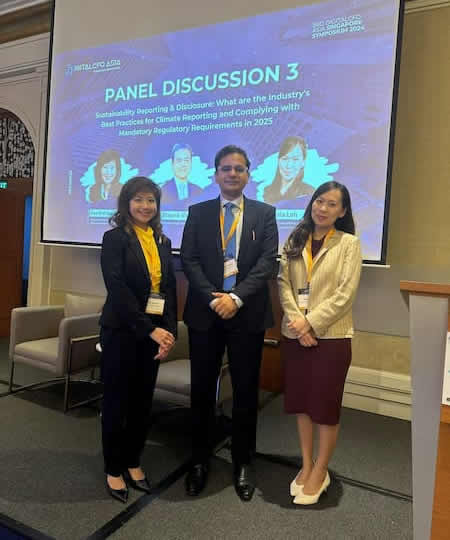Mayank Vishnoi on the panel at the 3rd DigitalCFO Asia Singapore Symposium 2024

16 May 2024
ChemOne Group’s Chief Financial Officer, Mayank Vishnoi, recently spoke at the 3rd DigitalCFO Asia Singapore Symposium 2024. He was part of a panel discussing sustainability reporting and disclosure as well as industry best practices for climate reporting and complying with mandatory regulatory requirements in 2025.
Here are some key takeaways from the session.
Avoid Greenwashing when Target-setting
With companies from a variety of industries participating in the race to reduce carbon emissions, it is necessary for industries to set realistic targets. Instead of goals reflecting leaps and bounds of progress, it would be worthwhile for industry players to take a step back and set more manageable targets of reducing their greenhouse gas emissions, for instance 20% in comparison to net-zero. Different industries already present different challenges and obstacles when it comes to reducing emissions, and these challenges would be more apparent when trying to achieve net zero straight away, due to the complex nature of reducing carbon emissions.
Ensuring Sustainability both in Business and in Financial Returns
It is necessary for industry leaders to implement strong, effective strategies which ensure stability, whilst still promising decent financial returns for the respective stakeholders. Achieving balance between these two aspects would be a tall order, but Mayank believes that this is possible by enhancing a business’ value, which will in turn liberate the benefits of a good sustainability policy.
Scope 3 Emissions Adaptation
Measuring and tracking Scope 3 emissions has proven to be challenging for companies and large enterprises, due to this scope being dependent on activities from assets that are not owned and controlled by said companies, but rather are indirect emissions that occur across their value chain. To that end, Mayank specifies that ChemOne needs to rely heavily on third party consultant data to guide their own reporting, as many in the industry do. This underscores the importance of accurate Sustainability Reporting and listed companies and large entities who do this will have a measurable impact in the race to net-zero.
Carbon Credits
Mayank shared that ChemOne has no intentions on buying carbon credits to offset emissions, but rather is focused on trying to reduce emissions as much as it can. This is why all ChemOne projects are planned and built to comply with environmental standards from the get-go. He cited the example of the Pengerang Energy Complex (PEC), currently in development, which is set to produce a carbon emissions output that is 30% lower than competing facilities. But he did acknowledge the fact that as time goes by, price fluctuations will be a challenge faced in carbon credits trading.
Future of Sustainability
It is widely acknowledged that meeting sustainability targets will be an uphill battle. However, there are still opportunities abound. Singapore is in the right position to be established as a green hub in Asia, by making them the leading renewable energy source in Southeast Asia. Mayank believes that this would create vast benefits for the country, one of them being improved valuations for organizations based in Singapore.